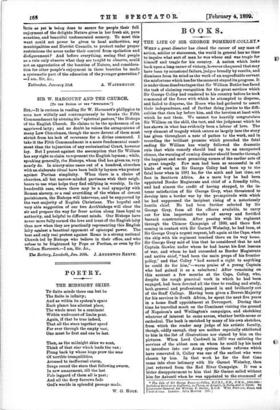SIR W. HARCOURT AND THE CHURCH. [To 111X EDITCOlt OF
TEL " SPZCZATOR."] SIR,—It is curious in reading Sir W. Harcourt's philippics to note how wilfully and contemptuously he breaks the Fifth Commandment by abusing his "spiritual pastors," the Bishops of the English Church. He claims to be the spokesman of an aggrieved laity ; and no doubt he voices the antagonisms of many Low Churchmen, though the more devout of them must shrink from his lack of reverence for a divine command. I take it the Fifth Commandment is a more fundamental enact- ment than the injunction of any ecclesiastical Court, however lay. But I protest against the assumption that Sir William has any right to claim to represent the English layman ; while, speaking generally, the Bishops, whom God has given us, very nearly do. In ninety-nine cases out of a hundred, churches with an elaborate ritual have been built by laymen who protest against Puritan simplicity. When there is a choice of churches, all but narrow-minded partisans wish their neigh- bours to use what helps they find edifying in worship. In the hundredth case, where there may be a real sympathy with Roman slavery, or a real overriding of the wishes of devout parishioners, the Bishops will intervene, and be supported by the vast majority of English Christians. The hopeful and very able suggestion of our two Archbishops will clear the air and prepare the way for freer action along lines loyal to authority, and helpful to different minds. Our Bishops have never more fully earned the love and trust of the English laity than now when they are practically representing this English laity against a fanatical opponent of episcopal power. The best and only real protest against Rome is a strong national Church led by Bishops who believe in their office, and who refuse to be frightened by Pope or Puritan, or even by Sir William Harcourt.—I am, Sir, Sze., The Rectory, Lambeth, Jan. 30th. J. ANDREWES REEVE.


































 Previous page
Previous page